Music Reviews
STRUNG OUT! A HISTORY OF ROCK GUITAR - Kenny Robertson
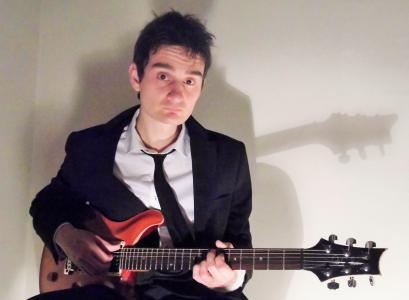
Kenny Robertson's show was a pretty comprehensive journey through the history of the rock guitar genre from the seminal blues of Robert Johnson through to the "shredders" of more recent times. Kenny's own impressive playing was supplemented by a bassist (who also vocalised form time to time) and a drummer to give a genuine band experience in the Arts Centre. The presentation was well thought through and occasional video material added to the experience - although the quality of the playback stuttered somewhat.
Kenny appeared a little nervous to start with but soon settled in after some good natured banter and interaction from the audience (and once he had negotiated Jimi Hendrix's Castles Made of Sand, the number he admitted had given him the most cause for concern in the run up to his show!).
William Allen
FESTIVE FANCIES - Sheffield Lydian Ensemble
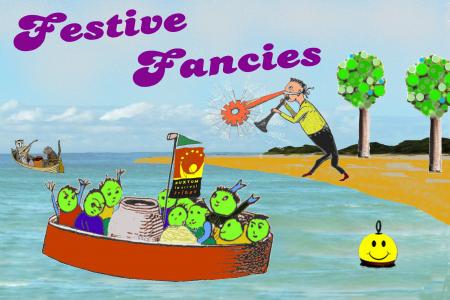
Buxton Methodist Church
John Kilpatrick has had a long career in music – notably choral music – and has sung with, and directed, the Sheffield Lydian Singers for a dozen years or so. Anyway after 65 years of singing John is turning to other passions; the Buxton Fringe was privileged, therefore, to hear John’s final programme of choral music. The choir was 15 strong and the musical support came from a group of woodwind and brass players with keyboards and percussion. This whole Ensemble offered a rich variety of sounds and textures for composers and arrangers to work with.
John has always been a bit mischievous; I remember when in 2010 he brought a performance of Monteverdi’s Vespers of 1610 to the Fringe some people were puzzled that it should start at 4.10pm. So it was not entirely surprising to see that this ‘farewell’ programme should include an extended Jumblies Suite. There was much to relish and enjoy before that however.
After a sung safety announcement – pointing out the various fire exits – there followed a short Gloria. The ten movements were barely a minute long each – and this economy seems typical of John’s compositional approach and the Sheffield Lydian approach to music in general. There is no padding or unnecessary repetition. The Gloria lacked a certain stylistic unity perhaps – and that might explain why it did not impress competition judges – but there was some lovely aural surprises and delights.
There followed three pieces – united by the word ‘Blue’ in their titles. ‘The Blue Bird’ composed for choir by Charles Villiers Stanford; Richard Rodgers’ ‘Blue Moon’ arranged for a clarinet quartet; and ‘Basin Street Blues’ for the whole ensemble.
Then followed a selection of pieces intended as ‘Reflections on the Human Condition’ and this produced some of the most attractive pieces of music-making in the whole programme. An arrangement of Purcell’s ‘If music be the food of love’, an anthem ‘Remember now they Creator’ and a madrigal ‘Lay a Garland’ were all warmly received.
Then followed what was just the second performance of a piece by Robin Hughes – one the Ensemble’s tenor voices. He has taken six short poems – including those by Bridges, Housman and Larkin – that reflect in some way on the passage of time and making the most of that allowed us. The choir enjoy singing this work – and it is to be hoped that they get plenty more opportunities to do so.
Which brought us to the Jumblies’ Suite; this included Lear’s poems The Jumblies, The Dong With A Luminous Nose, Stravinsky’s setting of The Owl and the Pussycat plus a number of Lear’s quatrains. Now Lear was not an especially happy man – and his nonsense betrays his occasional melancholy. This is nowhere more evident than in The Dong. I have enormous affection for jazz composer Neil Ardley’s setting – narrated incomparably by Ivor Cutler – and there were moments when I yearned for a clearer narrative line in John’s composition. The piece as a whole was richly entertaining.
John allowed himself a little indulgence singing the first verse of ‘To say goodbye’ solo before effectively handing over the Sheffield Lydian Ensemble to George Nicholson. These singers and players have brought great pleasure to Buxton; it is hoped that George will bring them back soon.
Keith Savage
SUMMER SERENADE - Bel Canto Singers

This large choir from the Wirral gave us a programme of popular songs which they sang with well-rehearsed gusto and which worked well in the Arts and Crafts revival church of St Mary's. Between many of the items there was a short reading of a poem or other appropriate text which worked slightly less well in the uncertain acoustic of this venue.
Also included in the programme were solos from the lyric tenor, Terence Robertson, who was particularly good in his excerpt from Act 3 of Tosca by Puccini.
In many of the numbers the large audience were invited to join in which many found added considerably to their enjoyment. The choir were very well served by their accompanist , Jon Barton, who obtained a surprisingly powerful dynamic from the St Mary's piano.
Peter Low.
OPERA DELIGHTS - City of Manchester Opera
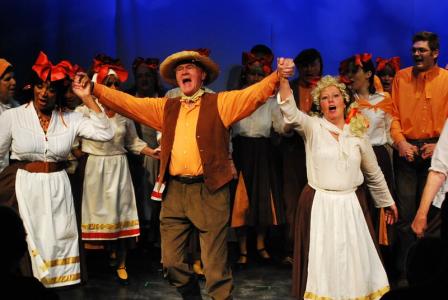
City of Manchester Opera comes regularly to the Buxton Fringe, and is as regularly well reviewed, so how did I miss them all this time? Error now corrected.
The Buxton Festival specialises in lesser known operas, but with this Fringe performance we got meaty extracts from mainstream works, favourites because they are so good, musically, dramatically, entertainingly, or all those things together. COMO does opera concerts large and small, as well as semi-staged and fully staged productions, in the original language, whatever that may be. The company is about 30 strong, and strong is the word, as the soloists come from the chorus, and step back into the chorus after doing their solo pieces. Many of the singers have bold and suitably operatic voice and delivery, and yet, back in the chorus they produce a melodious blended sound.
Since operas are mostly, to the English speaker, in foreign languages, the singers need to be nimble with their words, and to have their dramatic context explained. Several members of the company stepped up to make the introductions, as did the conductor, and the convoluted, not to say unlikely, plots were put before us with verve and no undue solemnity. The explanation of the hide & seek nonsense from Act 1 of The Marriage of Figaro might tax the memory of even those who already knew it, but it came over as funny, rather than simply contrived.
We had Verdi’s Otello, Act 1, with piano accompaniment (Jonathan Ellis) doing his best to stand in for mighty Verdian orchestration, followed by Puccini’s Madame Butterfly, Lucy Lee an outstanding and moving Butterfly hoping for One Fine Day. From The Marriage of Figaro, Cherubino (Elizabeth Sillo) confronted the problems of love, Figaro (Simon Horsefield) cheerfully warned Cherubino of the hardships of the military life, and the trio contended with the hide and seek and involuntary revelations and confrontations already mentioned. The first half ended with more Verdi, this time Macbeth, with a notably tender lament from Macduff (Eric Cymbir) for his murdered children.
The second half had Offenbach’s Tales of Hoffman, the Barcarolle lilting and beautifully sung in the well balanced voices of Helen Sharpe and Elisabeth Sillo, and the rousing Septet to conclude. Duets from Bellini’s Norma, very demanding virtuoso writing, and Bizet’s The Pearl Fishers, famously melodic and winning, were followed by Donizetti’s Lucia di Lammermoor (“a Scottish affair”). This was the wedding scene, with dramatic interruption (a plot device also used in Jane Eyre), in bravura musical form and ensemble singing. The programme ended with more Verdi, La Traviata, Violetta’s party in Act 1, the guests setting about the Brindisi with gusto.
I have not named here all the soloists, 14 by my count, though most of them merited it, had space permitted here. Their qualities vocal and musical seem to me outstanding, given that the whole company is amateur, even if a good many have studied music, and some have also sung in the chorus of professional companies (for instance Buxton Festival chorus) from time to time. Their director, Juan Ortuño, a graduate of the RNCM and busy figure in the music of the Manchester area, was deft, clear, clearly inspiring, as well as amusing in his explanations of plot (‘deft’, ‘clear’, ‘amusing’ are very good words in a conductor!). Jonathan Ellis did wonders with the piano reductions of the original great orchestral effects.
The company makes an excellent contribution to the mix of the Fringe, where they only do one concert. I can only urge opera lovers (or those who think they might like it if it isn’t too heavy, or too long) to make sure they catch their next visit.
Ursula Birkett
PIANO RECITAL - Jonathan Ellis
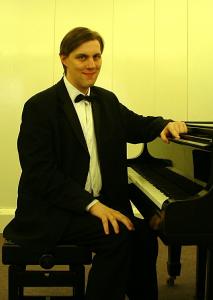
t was a pleasure and a joy to review this recital by Jonathan. Good pianists are not exactly rare, but good musicians who display the assured logic of performance that Jonathan does, with the clear enjoyment of the music and the playing, are indeed rare. Jonathan's programme was varied and demanding and was performed with consummate skill and panache.
The Bach Concerto in F major was masterly and an excellent opening work for a recital. The explanatory words from Jonathan just helped to set the piece in a historical context. An assured technique is always necessary to capture the music and convey it to the listener, and this Jonathan has in spades. What is such a delight is the fact that this prodigious technique is worn lightly and never obtrudes between the listener and the music.
The Bach was followed by the mighty Schubert Piano Sonata in B flat, which is the last completed piano sonata the composer wrote. This 4 movement tour de force was given a masterly performance. I always think I can hear Schubert contemplating his own impending death in this work for in spite of wonderful melodies and amazing trawls through some seemingly unrelated keys, this work shows us what a truly impressive mind he had. The first movement was expertly handled and was quite the most inspiring rendition I have heard for many years. The Andante was a deeply musical interpretation of this sad lament, and the middle brighter section still had overtones of foreboding - this can sometimes sound flippant, but not in Jonathan's hands. The Scherzo, joke though it was meant to be (according to Jonathan's wonderful introduction), was suitably jocular whilst still being slightly threatening. The last movement was deft and majestic at the same time, with the inbuilt lyricism of Schubert always present. Bravo!
After the interval we were treated to Beethoven's "Moonlight" Sonata. This was full of superb phrasing, clear line, and wide dynamic contrasts. I was reminded of Jose Iturbi's recording, who, for me gave the best performance of this work, albeit years before I was a serious musician. I think Jonathan did it better.
3 "Songs without Words" followed and all performed with love and affection. Then Chopin's Fantasy in F minor showed us what an amazingly logical and brilliant pianist Jonathan is. It was a bravura performance.
We had the extra treat of two encores. The second was Liszt Hungarian Rhapsody No 12 - what a piece and what a performance! But before that we were all delighted by "Marigold" by Billy Mayerl - probably his best known piece and one we don't hear nearly often enough. Thank you Jonathan for a splendid evening of music making.
Andrew Hodkinson
DANCING & THE DIVINE/SHAKESPEARE'S MUSIC/WORKSHOP - K'antu Ensemble
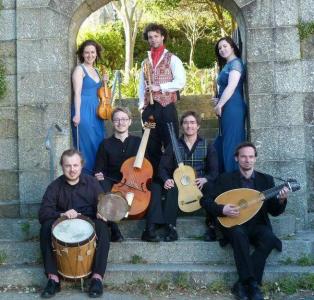
It is good to see last year's winner of Best Small Classical Ensemble back on the Fringe with new music and formats. Since last year, they have been very busy and you may have heard them on Radio 3 as InTune's 'houseband' at the Southbank Centre. This year, they ambitiously put together a series of three events, of which the Children's Workshop was the first. The group is experienced in running this kind of event, being members of the 'Live Music Now!' artists group, providing workshops and interactive performances for Older People and Children with Special Needs.
It is worth commenting on the group's preparation for the workshop. The detailed literature gave a taster of the musical and dance aspects of the workshop and copies of the music were available to download from their website. Copies of the literature were sent to all schools within 5 miles of Buxton. So with all the hard work up front, what was the workshop like?
The handful of youngsters who attended were treated with a personal masterclass in early music and its instruments. K'antu play a variety of recorders plus violin, viola de gamba, charango, lute, guitar and vocals too. It would have been interesting to see how the youngsters recorders and violins would fit in with the saxophones - sadly, but not surprisingly, the saxes stayed in their cases.
After a demo of a Spanish tune by K'antu alone, the youngsters joined in, learning a tune based on a folky D minor scale in small chunks before learning to improvise over a drone. They then moved on to Les Bouffons (one of the tunes provided on the website) with variants of easy and hard melody parts. I did like the tip that if the music is too hard, then just make up the ornamentation!
A slower melody followed to calm everything down, after which the group provided the youngsters with the chance to try some of the unusual instruments - baroque violin, viola da Gamba, baroque guitar, charango - which they took to with gusto.
It really is good to see semi-professional musicians bringing genuine outreach work to the Fringe - passing on their enthusiasm and inspiring future generations - something it would be good to see more of in future years.
After a final 'tutti' item, the children were invited to attend free of charge the other 2 events by K'antu - 'Dancing and The Divine' on Friday night, and 'Shakespeare's Music' on Saturday lunchtime. I did drop into the Friday night concert, and for those that couldn't make it, you missed a treat of world / early folk music - maybe you pop along to the URC at 12.30 for their last concert ?- or if all else fails buy a CD from their website www.kantu-ensemble.co.uk.
Martin Bisknell
MART RODGER MANCHESTER JAZZ - Mart Rodger
Further date 26 July at 7.30pm
Mart and his band played the Fringe a couple of years back at The Railway Hotel. He said he was keen to come back and play in the Methodist Church because the acoustic is so good – and because it gave band pianist Roger Browne the chance to play on a grand. So it was great to see and hear the choice vindicated. On the question of the Church acoustic it was interesting to note that Mart and his band played on the main floor of the church – and not from the steps that lead up to the altar as some others choose to do. It sounds to me that playing from the floor works better.
On the question of the piano, Roger had the chance to shine early in the second set with a medley from ‘My Fair Lady’ accompanied by Ken Marley (bass) and Chris Pendlebury (drums) and he seemed to relish the opportunity of spreading out in a way that is so much harder on an electric keyboard. The medley concluded with ‘I’m getting married in the morning’ – not me, said Mart. He shared the information that he and Janet married almost 57 years ago – having met in primary school
Another of the highlights was trombonist Eric Brierley’s feature, ‘The Lord Is Listening To Me’ – a piece he played at his own wedding in Hayfield a little way back. It was banjo player Louis Lince’s birthday and his ‘present’ was the chance to play a solo rag.
In one respect there isn’t much point going through the whole set list – Mart said the Band would be playing a completely different set on their return on the 26th. However, a list of some of the songs – and band members share out the singing duties when required – will give you a flavour of what to expect.
Mart Rodger Manchester Jazz is firmly rooted in the traditional and Dixieland music of 1920s New Orleans. To establish that today’s set kicked-off with two New Orleans favourites – ‘Bourbon Street Parade’ and ‘Perdido Street Blues’. Other standards of that ilk included ‘Alexander’s Ragtime Band’ and ‘Wolverine Blues’.
The programme also included much-loved songs such as ‘Moonlight becomes you’, ‘’S wonderful’, ‘My Blue Heaven’ and a rousing ‘Sweet Georgia Brown’ which gave drummer Chris Pendlebury the chance to solo.
These guys must have played some of these tunes hundreds of times and could play them in their sleep – but it is a testament to their genuine love of the music, the enjoyment they get from playing and the enjoyment they want to give audiences that there is no letting up in their playing. Regular trumpet player Allan Dent isn’t playing for a while – he awaits heart surgery – so Ged Hone was deputising. To accommodate him there were some key changes – but otherwise no one would have noticed.
It was probably the hottest day of the year in Buxton and Mart observed that only he and the band were wearing ties – and he seemed to doubt that they would keep them on for two hours. So relentless was the entertainment that they had no time to take them off.
This is the one of the few authentic jazz events in this Fringe. By any standards it is music-making of the highest quality. If you haven’t heard Mart and his band before remedy that this weekend.
Keith Savage
A BICENTENNIAL OF SAX - Sovereign Saxophone Octet
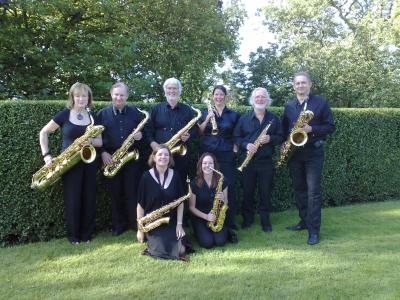
Buxton Methodist Church: 19 July
Adolphe Sax was born in 1814. Add him to your list of famous Belgians. He invented the saxophone among other things. His 200th birthday seems a perfectly good reason for a saxophone octet to have a party – and surely Adolphe would have approved.
The Sovereign Saxophone Octet (SSO henceforth) gave a full and varied programme that offered plenty for any sax enthusiast and enough for any music lover. The programme was justified by some connection either to Sax’s life or the development of his instruments over the last 170 years or so – and even if some of the justifications were a little tenuous they were forgivable.
For example, the opening ‘Engine No.9’ was allowed because steam engines – like saxophones – demand high precision engineering to work and to be affordable. This may well be true, but it is pushing the connection a little – but given the sound that 8 saxes make (two each of soprano – one straight, one curved – alto, tenor and baritone) this didn't matter. (What chance we have of seeing or hearing a bass saxophone I wouldn't know).
The programme included works that pre-dated Sax – Giovanni Gabrieli died 400 years ago and Antonio Lotti in 1740 – but their choral church work lends itself well to saxophone arrangements showing the different ‘voices’ off to good effect.
Whilst the sax is now widely regarded as a jazz instrument it was much used in military bands and in orchestras prior to that and the arrangement of Holst’s ‘St Paul’s Suite’ was a suitable reminder of that tradition.
Not surprisingly, however, the core of the programme was ‘jazzier’ in tone and mood. In the first half of the concert were arrangements of two Jelly-Roll Morton band numbers – ‘Sidewalk Blues’ and ‘The Chant’. After the break we had ‘Puttin’ On The Ritz’, ‘Singing In The Rain’ and Gershwin’s ‘I Got Plenty of Nuttin’’ and the only piece actually composed by a saxophonist, Paul Desmond’s ‘Take Five’.
The whole programme was great fun and the stories were ‘educational’ without seeming like lectures. The SSO have been to the Buxton Fringe before. They had a good and enthusiastic audience – it is to be hoped that they return soon.
Keith Savage
AN EVENING WITH ELLA - ARKangel
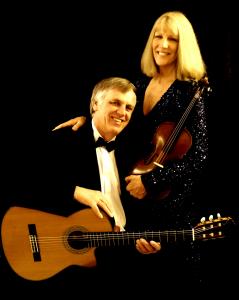
Underground Venues (further performances 21-25 July)
ARKangel is a duo – acoustic guitar and electric violin. The lady who plays the violin also sings and for this story provides some narrative on the life of Ella Fitzgerald. I’m sorry I don’t know their names.
The musicians that make up ARKangel are skilled and experienced professionals who delivered the songs and music well and coped well with the intermittent noisy distractions of the adjacent Fringe Bar. ‘An Evening With Ella’ is not a ‘tribute show’ – this is not an attempt to recreate the music or voice of Ella, rather it is something of a biography with plenty of apposite musical illustrations.
Briefly Ella Fitzgerald (1917-1996) had a wretched childhood. Her family was poor; she was abused by her stepfather and in school. By the time she was 15 she was an orphan and was working on the streets of Harlem. She won a talent competition in 1934 and for almost 60 years she had a hugely successful career – her reputation forever secured by her recordings of the Great American Songbooks between 1956-1964. Despite her fame and wealth Ella did not have an especially happy personal life. She worked tirelessly, on the road for 40 weeks a year or more and recording prolifically. Despite her professional success and critical and public approval Ella never really overcame her fear of performance prior to going on stage. She always had problems with her weight and developed diabetes. Poor health effectively ended her career in the early 1990s.
So this is the story that ARKangel told and illustrated. The songs included: ‘It don’t mean a thing (if it ain’t got that swing)’; ‘Ain’t misbehavin’’; ‘A Woman Is A Sometime Thing’ and ‘Summertime’ – both from ‘Porgy and Bess’, of course; ‘Stormy Weather’; ‘Cry Me A River’; ‘Chattanooga Choo Choo’.
With material of this quality to work with ARKangel was on a winner. Even though this is emphatically not a ‘tribute’ act it is hard to get Ella’s voice out of your head and the show perhaps needed a more natural jazz voice rather than a singer. For that reason I perhaps enjoyed the instrumental versions more – or the non-Ella songs such as the Kurt Weill/Ira Gershwin ‘The Saga of Jenny’ which was included to illustrate Ella’s determination to overcome adversity.
There was a good-sized audience for this opening show and their appreciation was loud and warm.
Keith Savage
LULLABY OF ANDALUSIA - ARKangel
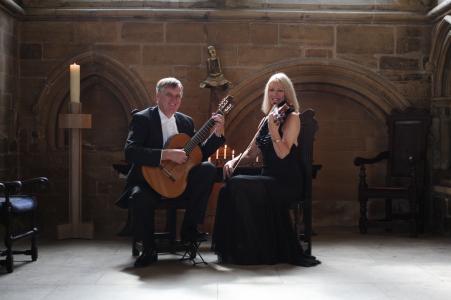
Sunday 20 July 12:45 Underground Venues
If you want to swap the glorious Festival Fringe atmosphere for the sultry, arid climate of Andalusia then go along to Underground Venues at 1:30 everyday this week to sample ARKangel’s ‘Lullaby of Andalusia’. You will be transported by an event which evokes the history and traditions of this region of Spain with a compilation of music from the region.
A capacity audience enjoyed the first performance from ARKangel, an accomplished violin and guitar duo who are obviously immersed in this music as they play with the subtlety of dynamics and tempo changes that are inherent in the style.
Introductions enhance the flavour as we are told about the various influences on the music including cultures Moorish rule, as well as the later influence Andalusian workers who migrated to Argentina and brought the rhythms of tango back with them.
We heard the harsh sentiments of an Andalusian lullaby where love and death are mentioned in the same breath with a voice which had the qualities necessary for flamenco singing.
Examples of the influence of traditional music on classic composers were given with Manuel de Falla’s ‘Le Tombeau de Claude Debussy’ and the programme finished with an arrangement for the violin playing the haunting Andante from Rodriguo’s ‘Concierto de Aranjuez’.
Future performances Mon - Fri 21 - 25 July 13:30 Underground Venues
Carol Bowns
AN AFTERNOON OF SONG - ChorAlchemy - Youth Chamber Choir
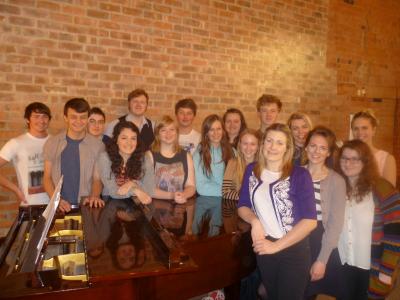
When I signed up to review ChorAlchemy (Youth chamber music) I was a little reticent as sometimes the term youth can also imply mixed abilities as people hone their skills. This time I couldn’t have been more wrong. The choir I experienced was nothing short of exceptional.
Their amazingly varied repertoire, covering everything from David Guetta to Shakespeare, was sung with accuracy, emotion and impeccable timing. The solo’s showcased the talent of every individual and the duets were breath taking. The rendition of “All I ask of you” from Phantom of the Opera, had my hands clapping so hard they hurt.
The location of St Mary’s church, with its beautiful light and fabulous acoustics only added to the intimate atmosphere and it was only the pleasant informal nature of the choir leader, who openly encouraged his singers, which gave any indication these weren’t seasoned professionals.
This was simply an afternoon of great music, and I will definitely be signed up to hear ChorAlchemy in the future.
Amy Dollery
AMARETTI AGAIN - Amaretti Chamber Orchestra
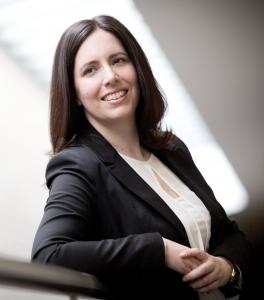
St John’s Church
The Amaretti orchestra are now regular visitors to the Fringe;it was great to welcome them back again. Although they are essentially a string ensemble their programme this year included works for wind and harp soloists.
The concert opened with Debussy’s Danse Sacreé et Danse Profane with the highly experienced harpist Louise Thomson. Debussy had written the piece for a chromatic harp, that is a harp with a string for every note. Louse however played a conventional harp which meant she had to make a prodigious number of pedal changes but which she managed seemingly without effort. The result was stunning.
Having secured such a fine soloist the programme went on with pieces for solo harp, Pierné’s Imoromptu-Caprice Opus 9 and an exciting arrangement for harp of Gershwin’s American in Paris, denomstrating the versatility of the instrument and Louise’s mastery of it.
Then appropriately for the celebrations this year of Richard Strauss, we were entranced by his Duet Concertino for Clarinet and Bassoon Opus 147, with soloists Sarah Watts , clarinet and Laurence Perkins, bassoon. This rather neglected piece was composed in 1947 just before the Four Last Songs. It is actually a narrative piece and we were helped considerably in understanding it by a short explanation, given by Laurence, who told us the story of the princess (clarinet) frightened by a bear( bassoon) and identified the leitmotifs associated with the characters. It is a delightful work and the two soloists captured its wonderfully romantic essence.
After the interval we were treated to the Amaretti without any additional soloists. And, my word, their rich string playing sounded marvellous . The first work was a suite composed by the leader, Adrienne Splisbury very much in the tradition of English composers such as Elgar and Finzi. Adrienne told us that some of it had been written during a train journey from Manchester to Cardiff which made me wonder whether HS2 might lead to more lovely new music like this as well as faster travel!
The programme ended with the well known Dives and Lazarus by Vaughan Williams. As one might expect from this composer it is actually based on an folk song, in this case an Irish one, which very much pleased their Irish conductor, Sinéad Hayes.
Another fine concert . And the eponymous amaretti biscuits during then interval were a very nice touch.
Peter Low
DAVID YOUNGS: PERCUSSIVE FINGERSTYLE ACOUSTIC GUITAR - David Youngs
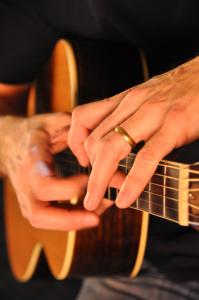
Underground Venues (further performance 20 July, 3.45pm)
David’s playing is not quite folk, nor is it jazz, neither is it classical – it has bits of all three in there. In the Fringe programme he gives Eric Roche and Michael Hedges as musical influences. My guess is that this isn’t going to mean much to most would-be listeners and his reference to unusual time signatures and scales may not help a potential audience much either. So if this sounds a bit arcane and dull I’m asking you to trust me on this one.
There are two things to say straight away about David’s playing – it is accessible (and I agree with his programme claims there). This is not quite the same thing as easy listening but it is strong in terms of rhythm and melody. The second thing is that it is a joy to watch him play. His technique is very visual and even if you know little or nothing about playing a guitar (and I’m in that category) it is fascinating to watch. Fingers and hands flying; attacking the frets and strings from all angles; beating out rhythms on the body of the instrument; all of this is absorbing in itself.
David is only playing in Buxton once more this Fringe and I’d encourage you to see and hear him. He seems to be quite a modest and self-effacing man – you can sample his style and music on You Tube if you do that sort of thing: https://www.youtube.com/watch?v=i1Y4oKe8h-8
He lives in Cambridge and his car journey to Buxton wasn’t much fun – so he may not be back here soon; catch him while you can!
Keith Savage
WIND WYND - Manchester Recorder Orchestra
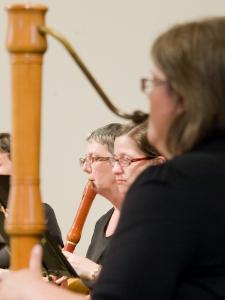
19/7/14 Trinity Church
The Manchester recorder orchestra was founded in 1982. Since then the orchestra have travelled around the country performing in a variety of venues. Before the performance began I was sceptical about the Manchester Recorder Orchestra as I would not have placed the words orchestra and recorder in the same sentence. Recorders as a whole in the music world are not very highly regarded and tend to be segregated to being played at primary schools. The Manchester Recorder Orchestra proves all of these beliefs wrong by their spectacular performance in Wynd Wynd.
A highlight of tonight’s performance was Kirsty Macdonald’s who performed the solo of Vivaldi’s Concerto in C sopranino recorder. Macdonald’s performance was extremely energetic and enthralling and I found it engaging and joyful. In the piece there is a range of different contrasts between MacDonald’s performance and the rest of the orchestra. The first movement of Vivaldi’s piece is slow and melancholy. Throughout the whole first movement the piece slowly builds up, getting faster. In the second movement the atmosphere of the piece changes to being faster paced and happier. Macdonald handled the transition from first movement to second with accuracy and grace.
Out of all of the evening’s performances my favourite was the Midsummer Meadow suite Op.6 piece. The second movement was particularly dark and menacing. I felt the piece as a whole was psychologically disturbing to both mind and soul as it is a very deep composition.
The Manchester Recorder Orchestra’s performance was beautifully executed and I would definitely go and see their shows in the future and recommend people to go and see them perform.
Phoebe Alderson
PASSIONS OF YOUTH, REFLECTIONS OF AGE - Laura Monaghan
The rather mystifying title of this recital did not reveal the marvellous programme of twentieth century songs given by Laura Monaghan , soprano, accompanied by Mark Cartwright making a most welcome return visit to Buxton Fringe. Laura has a stunning voice . Although not the most powerful of sopranos she sings with such confident sensitivity that she really deserved the standing ovation she received from the entranced audience.
The programme opened with the seven early songs of Alban Berg, presumably the Passions of Youth of the recital’s title. These were composed over one hundred years ago but they still sound surprisingly modern particularly to those who have yet to appreciate the works of Arnold Schoenberg under whom Berg studied. Laura sang in the original German but the helpful programme notes gave a full English translation. It was a brave choice of songs but Laura seemed to be able to manage effortlessly the demands of this complex composition.
Two songs in English , one, The nightingale, by Ned Rorem and the other Sure on this Shining Night, by Samuel Barber were followed by two exciting works by Poulenc, C and Fetes Gallantes both of which Laura sang in French.
After a short interval the main work in the programme Richard Strauss’ Four Last Songs, this being the Reflections of Age. Some -one once said that Strauss had brought romantic composition to an end somewhere around the middle of his opera Salome. But in fact the Four last Songs are deliriously romantic. And this performance, one that can easily stand comparison with some great recordings of the work, has to be one of the most memorable of this years’ Fringe, not only for Laura’s fine singing but also for Marks’ formidable accompaniment.
The programme concluded with I am the wife of Mao Tse Tung from the rumbustious opera Nixon in China by John Adams and then an aria from Menotti’s delightful opera The Telephone which had been part of the Festival programme seventeen years ago.
A wonderful recital.
Peter Low
VIOLIN & PIANO RECITAL - Duncan Reid & Jonathan Ellis
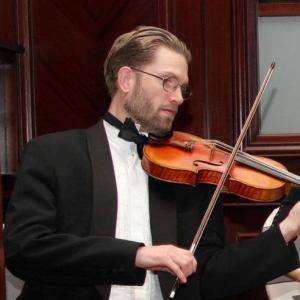
I was fortunate to attend the violin and piano recital by Duncan Reid and Jonathan Ellis at 1930 on the 18th July at Buxton Methodist Church.
The performers created a friendly an intimate atmosphere explaining the background behind the pieces.
They performed works by Brahms, Beethoven, Bartok, De Beriot and Raff.
The opening piece was the Brahms Violin Sonata 1 in G major op 78 which was first performed in 1879. They gave a moving performance bringing out the tender emotions in the music. You could well imagine that Brahms was expressing some deep sorrow. Perhaps it was for the death of Felix Schumann who was the son of his close, dear friends Robert and Clara Schumann. Jonathan explained about the cyclic aspects of the work. Several musical ideas appearing in more than one movement gave the feeling of unity. I felt particularly touched at the end when the music recalls the beginning giving a feeling that we have all come full circle. The singing quality of Duncan’s playing reminded me that some of the material that had been used previously in the song Regenslied was used in this violin sonata. The breathlessly beautiful haunting melody which opened the last movement was example of material derived from this song.
In the Kreutzer Sonata Beethoven demanded a high technical proficiency with numerous fast passages high notes and large chords on the violin and such like. The performers’ technical abilities were very much up to the challenge of one of the hardest violin sonatas. They brought out Beethoven’s personal turmoil in the aggressive first movement. They also managed to make the extreme contrasts of mood very effective.
I think they expressed the primitiveness of the Bartok convincingly as they did the joyfulness and humour in the De Beriot.
The Cavatina by Raff is regularly performed as an encore and this piece delighted the audience
I also learnt a great deal. For example the part Raff played in the orchestration of some of Liszt’s works and that he also set up a class at the Hoch Conservatory in Frankfurt specifically for female composers.
This was a great performance.
Roger Horvath
DERBYSHIRE CCYO SUMMER CONCERT - Derbyshire City and County Youth Orchestra
I have been reviewing the Derbyshire City & County Youth Orchestra for a few years, so by now I know that I will not be disappointed, and last night was no exception. Over 100 gifted players were happy to show the capacity audience what they could do with an interesting program. They were directed on the 5 day course and in the concert by the more than able Mark Herron.
That size orchestra should produce a big sound - and they did! However it is slightly too rich for even the Octagon Hall, especially with all the drapes pulled across the windows. This had the effect of muffling the clarity of the string sound but not taking much volume off the Wind, Brass & Percussion. Consequently in the Overture to Sullivan's Yeoman of the Guard, there were times when the orchestra sounded more Military Band with optional strings. Mind you, I imagine that even Sullivan would never have heard it performed with such gusto and enthusiasm. There were some lovely solos in the Wind, and ensemble and intonation was mostly secure.
Then came the specially commissioned work by Paul Patterson. Written in three movements around Derbyshire folk songs, this work paid more than just lip service to Malcolm Arnold in terms of style and orchestration – and was none the worse for that. It picked-up the youthful enthusiasm of the performers from the first note.
The Intrada is based on The Bonelace Weaver's Song, and the orchestra pass around the melody with rhythmic fun and games – interesting use of pizzicato strings to enhance the rhythm. The 2nd movement, Pastoral, featured a plaintive melody (Down in Yon Forest), for the 13 strong viola section, and this tune gradually built up in a series of variations for the whole orchestra. There were a couple of “moments” of insecurity, and dodgy intonation, but the movement came off well. The last movement, Dance Variations, delivered what it said on the can, namely a series of variations on Six Jolly Miners, including a waltz, and a jig. The climax and ending were a perfect vehicle for showing the skills and energy of this orchestra. This was a well crafted work and sufficiently interesting for the listener.
After the interval, the orchestra tackled the ever popular, and ever tricky, not to say difficult, work – Holst “The Planets Suite” - all seven movements. I have not got enough room here to mention all 7 movements in detail, but overall this was a great attempt. The violin solo in Venus sounded a little shy, and the 'cello section had a moment of poor intonation. Venus was, for me, a little fast. In Mercury, the wings were suffering from the heat and it didn't quite speed along as it could have. It seemed to lack poise.
In Jupiter the Englishness of the music was well judged, the rhythms mostly tight, but more poise would have been good. The “I vow to thee.....” section was superbly rich and full if a little rushed – this movement needs a little more space.
It's difficult for a youth orchestra to capture the concept of 'old age' (something I am becoming quite good at sadly) and it did feel a little sprightly for my taste, but maybe I'm getting jealous! Uranus was a good cross between Tolkien and Disney as a magician, and the percussion really enjoyed themselves here. The real magic of the evening was Neptune, including heavenly chorus hiding in the bar!
This is a BIG work to bring off and apart from a few creaks, intonation and ensemble blemishes, this was a good performance – and in that heat it was a special evening. Well done Mark and well done Youth Orchestra.
Andrew Hodkinson
MUSIC ON TAP - The Buxton Tap House
As part of the Fringe the Tap House is giving us a series of free shows and last night we were treated to the Glen Bartley Band. I must admit to not having heard of them before this, but I'm glad to say I'm a convert!
Like many artists Gren Bartley has a band with him on live dates and the 'band' on this occasion was made up of Gren Bartley on banjo/guitar/vocals (and ebow for those of you who like Sigur Ros), ably assisted by Sarah Smout on cello/vocals and Julia Disney violin/piano/vocals. Most of the song were taken from Gren's second album 'Winter Fires' which is part of what R2 magazine says is "an alarmingly good canon of work" and on the basis of this show I cannot disagree.
If you like your music of a folky/singer-songwriter nature then I can heartily recommend this to you and that you go buy the album as you've missed their only show in this year's Fringe. You can get it here: http://fellside.com/Shop and you can see/hear Gren on both Youtube and Myspace.
If I have any criticism it is that it wasn't the best venue for quiet contemplative music with all the hub-bub of a bar frequently making it a struggle to hear clearly. That said, it is good to have a range of venues and we should be grateful to the team at The Tap House for bring this set of musicians to town. I really hope they come back to next year's Fringe!
There are more show coming up at the Tap House before the end of Fringe and I will certainly try and get to some of them. See you there?
Ian Parker Heath
20TH ANNIVERSARY BUXTON FRINGE CONCERTS - Partita: Medieval/Renaissance/Baroque Music
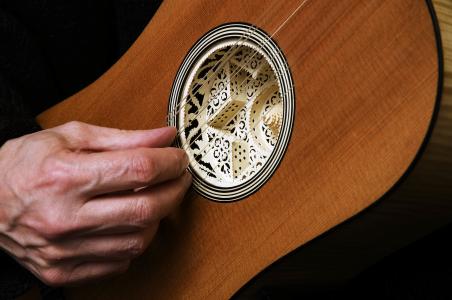
17 July, St John’s Church (and again, with a different programme, at Buxton Methodist Church, 24 July at 1pm.
It hardly seems possible that Partita have been coming to Buxton for 20 years – they look too young! Anyway Roger Child promised that to mark the occasion they would play a mixture of old favourites and some new material (new in the sense that it is new to their repertoire – nothing they played was much less than 300 years old and the oldest songs were nearer 900 years old).
For those unfamiliar with Partita they are a quintet specialising in medieval, renaissance and baroque music and between them they play about a dozen instruments (and have two excellent singers) meaning that there is an almost limitless number of permutations and it is rare for the same line-up of voices and instruments to be repeated in the course of a programme.
The programme was neatly divided into themed sections with a couple of dozen pieces in a concert that lasted for 100 minutes overall. Trying to pick out the highlights is difficult – suffice to say that in the unlikely event of finding myself in heaven this is the music I would expect to hear.
Partita are blessed with the voices of Sasha Johnson Manning (soprano) and Holly Marland (mezzo soprano) and it is a real pleasure to hear them in this sort of chamber setting. So for example, the first part of the concert closed with some Italian baroque pieces by Vivaldi and Tonelli with minimal accompaniment.
Sasha sang the first aria of Vivaldi’s ‘Nulla in mundo pax sincera’ with Roger Child on theorbo and Jill Lingard’s harpsichord; Sasha and Holly sang the less frequently heard ‘Ave Regina’ by Tonelli – again with Jill but with Roger playing the viol. The clarity of voices and instruments in St John’s with this music is stunning.
The second part of the programme introduced some more ‘heavyweight’ pieces in the final section called ‘Masters of the German Baroque’. Roger played Bach’s ‘Prelude’ [from the 2nd cello suite] on theorbo and you could have heard the proverbial pin drop – so absorbing was the music. Jill Lingard had a chance to shine when she played two movements from Bach’s Partita No 1 BMV 825 for harpsichord.
Sasha and Holly shared duties for two arias from Handel’s ‘Alcina’ – Holly singing the well-known ‘Verdi prati’ and Sasha ‘Credete al mio dolore’.
The programme came to a satisfying end with the only piece that all of the audience was likely to have known – Bach’s ‘Jesu, joy of man’s desiring’. This gave the whole ensemble a chance to show their readiness to listen to each other and to provide musical support. Margaret Walker’s harp, for example, is unfussy but integral to the Partita sound.
The Buxton Festival Fringe is fortunate to have Partita. Let us hope for another 20 years!
Keith Savage
CLUB ACOUSTIC FRINGE SHOWCASE CONCERT - Club Acoustic

Over the course of the evening I took over 2 pages of notes, breaking down the event into the sum of its parts but upon leaving the event I decided that this could not be further from what an acoustic night is about – Passion and speaking to your audience from the soul.
Club Acoustic is clearly a long running (12 years I am told) and extremely popular event – both as part of and standing aside from the Fringe - with the Buxton community. The event is brilliantly organised by people who are obviously very enthusiastic about the marvellous musical talent which can be found within the local area. Over the course of the evening my companion and I found ourselves emotionally moved, physically moved (much toe tapping and shoulder shimmying) giggling and singing along due to the fantastically varied programme.
This was one of the most enjoyable music events that I have been to in a while and I have recently just visited Glastonbury.
What a wonderful way to spend a Wednesday night, well worth the late ‘school night’!
Emma Grayson
DO YOU HEAR THE PEOPLE SING? - Tideswell Male Voice Choir
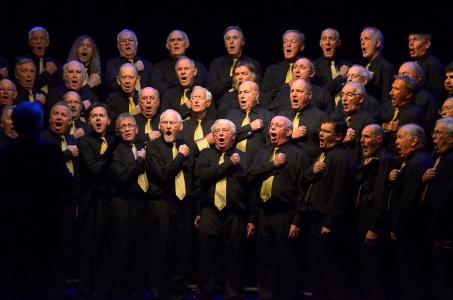
Wednesday 16th July
Now let’s get this bit out of the way; a good friend of mine, steeped in the tradition of Welsh male choirs, tells me that the Tideswell Male Voice Choir (TMVC) is not ‘that good’. Now even if that was the case, it misses the point. The TMVC is not about winning Eisteddfods. As musical director Dennis Kay emphasises – “We don’t do concerts – we do events. We’re about sharing our enthusiasm – for getting people to feel better about themselves and each other.” Probably one or two choir members would not pass the audition for some other choirs – but the TMVC is more inclusive than most.
If any of this makes it sound like the Choir isn’t good – well let me correct that straight away; the TMVC is very good. Dennis and the 40-strong Choir obviously enjoy what they do – but they also work very hard at being the best that they can be. The Choir has earned a reputation for what it does – not just singing but for entertaining people and for raising substantial amounts of money for local charities – and it isn’t about to throw that reputation away.
Let’s take one example from this year’s Fringe event to illustrate what makes the TMVC different to most others. The Choir sang last Sunday in front of the Opera House. A Buxton resident heard them then for the first time; he told Dennis that he’d loved what he’d heard and would like to sing with the Choir. He also said that he had some songs of his own: ‘Why not come and sing them at our show next Wednesday?’ Dennis asked him. Never having heard ‘Aussie John’ sing or seen him perform the invitation was issued – and accepted. And ‘Aussie John’ went down a storm with ‘No worries, mate’ and ‘What’s an Australian soul?’. Would anyone else have taken such a risk with their own event?
The TMVC programme for the evening was something of a romp through some much-loved numbers (for the most part). As Dennis properly reminded us the Choir was brilliantly accompanied by Christopher Ellis on piano and percussionist Derrick McGill. Christopher got to shine especially on a solo piece – Gershwin’s ‘Walking the dog’ (from ‘Shall we dance?’) and the introduction to ‘Bui-Doi’ from ‘Miss Saigon’ which Dennis introduced as ‘A song we haven’t learned yet’ but judging by the performance – complete with a solo by Tim – this seemed a bit of a bluff.
There was a medley from ’Les Miserables’, a brace by Rodgers & Hammerstein and an extended performance (I used the word advisedly) of ‘What A Wonderful World’ where on the lyric ‘I see friends shaking hands/saying “How do you do?” choir members came to the audience to shake hands and encourage us to the shake the hands of those around us. It make sound a bit corny written down but it says something about what the Choir tries to do.
This year the TMVC is raising money for Ashgate and Blythe House Hospices. On 8th and 9th November it is performing ‘Never Forget; a remembrance spectacular’ at the Pomegranate, Chesterfield and the Buxton Opera House.
Keith Savage
FAIRFIELD MUSIC FESTIVAL - St Peter's Church, Fairfield
Further performances 17th & 18th at 7pm
This lovely festival-within-a festival has been on all week and I was fortunate enough to catch the lunchtime performance by the choirs of Fairfield Junior and Dove Holes Primary Schools. Earlier in the week there had been a programme marking the century of the First World War which a Fringe veteran had reported as being “marvellous”. Other performances have included classical guitar, a jazz trio, folk, blues and gospel. As the Revd. Carl Edwards explained to me, “At times it feels like a bit of an oasis up here –and it is very important to us to be involved in wider community events like this.” St Peter’s is a delightful church and you’ll get a warm welcome, do go.
The 45-minute programme allowed the two choirs to alternate but what was obvious and notable was that the children had learned all the songs by heart, concentrated very hard on their musical directors but also enjoyed the opportunity to sing to a wider audience. I’m sure that the schools and the parents are proud of their choirs and the way in which they enhance the reputations of the schools; they have good reason to be proud.
The programme, taken as a whole, drew on a healthy range of musical sources – from pop, folk, music hall and European and African traditions.
Dove Holes is a village about 3 miles north of Fairfield on the A6. The school has 85 children and around a quarter of them (from year 2 to 6) were in the choir. The choir’s opening selection was of songs associated with the First World War: two marching songs, ‘Pack Up Your Troubles’ and ‘It’s a long way to Tipperary’ (originally a ballad we were told). They returned to the war-time theme later in the programme with a song from a mother to her child ‘Last Kiss Goodbye’. A bit of a tear-jerker.
The Dove Holes Choir included one piece that featured a soloist (and a boy at that!) Gary Barlow’s ‘Sing’. They closed the show in an update way with a West African song ‘Give Us Peace, Give Us Courage’.
The Fairfield Choir is all girls (as a former primary school teacher I know how difficult it can be to get boys to opt for singing). They began with very contrasting pieces – a jaunty African song and an English traditional song with a much longer melodic line. They also sang three songs that they will be singing at the wedding of a school teacher in the near future – ‘What A Wonderful World’ and Ellie Goulding’s ‘How Long Will I Love You?’ among them.
Fairfield also sang a couple of assembly favourites, ‘Count Your Blessings’ – a three-part round with a reggae/calypso feel and ‘We’re Learning’ set to a klezmer like rhythm. It’s insistence on good behaviour as a pre-requisite for learning would have satisfied the most back-to-basics government minister!
The whole performance was much enjoyed by the large audience – I really hope that the children also enjoyed the opportunity and will feel inspired to carry on singing and sharing.
Keith Savage
SIDEWAYS BAND - Sidewaysband
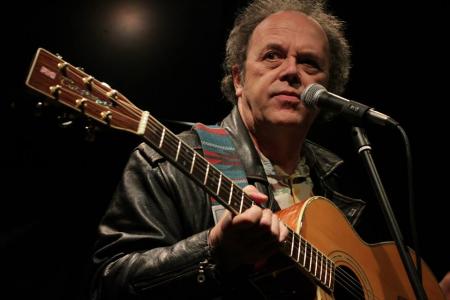
Somewhere in the mayhem of Carnival Day, Sideways missed out on their Fringe review. Happily they are somewhat ubiquitous at the moment and I managed to catch them at the Tea Chest last night where the vaulted roof – not dissimilar to that of the Barrel Room at Underground Venues – created a rather special acoustic.
Guitarist and song writer Peter Buxton has moved back to the town after 40 years (perhaps his surname was calling him?) and is joined at the Fringe by his fellow musician, a rootsy singer and ace percussionist from the South Coast, Bob Q. Their voices blend beautifully when they perform covers of Simon and Garfunkel for example but Bob’s also has a raw, bluesy quality that was fantastic for numbers such as Otis Redding’s Sitting in the Morning Sun.
Both have a lot of energy and when they really get into their stride they are quite irresistible. If there had been a few more of us and a bit more room I would have been up there dancing but less self-conscious souls had no such qualms and it was a special moment when during the band’s gutsy performance of the Timmy Thomas track Walking the Dog, a couple got up and started expertly jiving. Sideways indulged us with a real variety of music from John Mayer to Ezio, the Beatles and even Amy Winehouse but it was the up tempo ones that really wowed me with Joe Jackson’s Is She Really Going Out with Him? proving another winner.
That said, it was also great to hear some of Peter’s own melodious and reflective compositions including a tender song about his return to Derbyshire, I Will Still Be Here, and a number about the nerve-wracking nature of new love, Almost There.
Sideways offer a timely reminder of the joys of live music. There were occasions when their enthusiasm was such that they seemed to be struggling to keep up with each other but I would much rather have that than something perfectly synthesised and soulless. Peter at one point told us that there was blood on his guitar. It is quite possible that he is literally wearing his fingers down to the bone in the pursuit of entertainment.
Catch the band while you can at the Barrel Room at Underground Venues on July 19 and 20 and at the Tap House Buxton on July 22.
Stephanie Billen
TROMBONE TUNES, TROMBONE TALK - Sam Slide and Friends
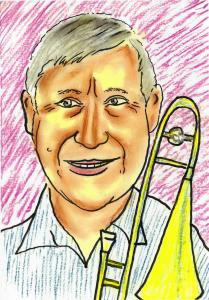
Sam Slide has long been a supporter of Buxton Fringe, and now, thanks to his (essentially) one-man show, Trombone Tunes, Trombone Tails he can number amongst the pantheon of performers to grace the town’s makeshift stages during festival time.
Upstairs at The Old Clubhouse provides an ideal venue for a summer’s evening. Buxton in all its leafy elegance can be seen through the windows and the airy room accommodates the crowd with ease; an intimate full house with added beer. There is an engaging informality to the evening, as Sam wanders through the audience; greeting them and making them feel welcome before the show starts. When it does, he, in turn, is welcomed like an old friend.
Sam’s approach is to take us on a potted musical autobiography from the tentative beginnings of the school recorder playing jingle bells to a triumphant Won’t You Come Home Bill Bailey. On the way we visit the school orchestra, brass band, swing band and various jazz bands. The narrative really takes off when, in the mid-90s, Slide is asked to play trombone at his friend and mentor’s funeral. He touchingly evokes a New Orleans second line with his rendition of Just A Closer Walk With Thee, with just the right amount of drunken swagger.
Sam Slide is joined on stage by two old friends and musical colleagues, John Wilde on piano and Neil Cross on guitar; the latter taking centre stage for a vocal rendition of the, sadly still-relevant, Brother Can You Spare A Dime, with effective backing and solo from Slide.
An entertaining middle section has Slide explaining not only how a trombone works, but also demonstrating a range of mutes, including discarded plastic pint pot and child’s trick or treat bucket. Musically, Sam Slide seems at his happiest with traditional jazz and his arrangement of St James Infirmary is particularly effective. His repertoire never really exceeds the 1940s, but judging by the enthusiasm with which each song is greeted and sung along to, I think his audience neither mind nor care.
Slide is a softly-spoken man and this resulted in many of the audience near the back of the room not really fully picking up on his anecdotes. This is a shame as he has a winning line in self-deprecation. A microphone would certainly help illuminate the frequently entertaining between song banter.
Ultimately, though, it is the sound Sam Slide makes with his horn that people have come to hear, and on the evidence of the applause and cheers that greeted almost every number, I confidently predict that not only will he return to entertain us next year, but he will quickly become a fringe fixture.
Malcolm Lomax
SUMMER SHOWCASE - Kaleidoscope Community Choir
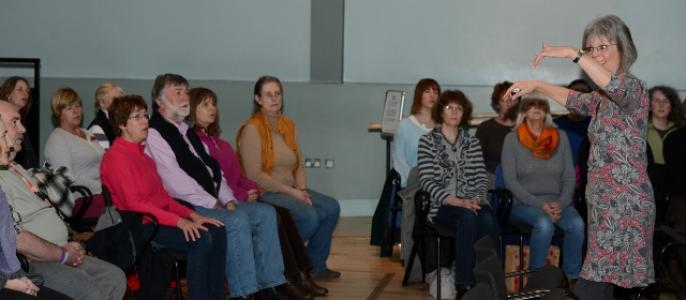
This may turn out to be a very short review because I spent all my time joining in singing and therefore had little or no time to scribble any notes for the review – which was great!
Carol Bowns is a Pied Piper personality, and it would be churlish not to join in. She involves people in the most infectious and happy way possible, never threatening and always spilling over with enthusiasm, which is impossible to resist – even if you want to. But why would you want to?
Not only does Carol enthuse with a seemingly easy and fun personality, but she works with a simple but musical logic from the known to the new and at no time is one made to feel wanting. This is a rare gift. It also comes from deep and careful preparation. Because of this the session was fun, informal and life enhancing.
We were split into the regular choir on one side and the “audience” on the other. Carol, with the deft use of recorded backing, and an OHP screen occupied centre stage and drew everyone into her space. The experience of joining in and singing along with the regulars was uplifting. Carol also delivers the message with a light touch, dropping in the musical terms when needed but without any mystery or sense of 'learning'!
The regular singers clearly enjoy all they do and feed off Carol's wonder of active music making.
We went through a small range of the sort of things the choir get up to from simple rote singing with rhythm and actions, through steadier melodic repertoire, to Calypso and Popular Song often in many parts. It was all so successful and happy, that the end of the session came all too soon. The choir deserve praise for showing us what they had been doing in the normal sessions, and Carol deserves praise for what she does and the wonderful way she does it.
Sessions recommence on September 2 and are fortnightly in the Pavilion Arts Centre from 1 – 2 pm. Just drop in and see, or come to every session – you won't be disappointed.
Andrew Hodkinson
THE WAR TO END ALL WARS - Darren John Poyzer
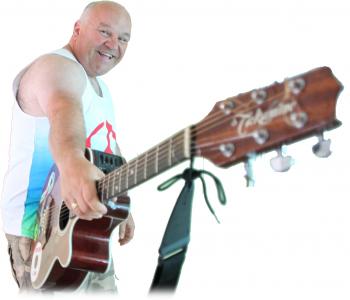
It is not very often that you are given the chance to sit and really listen to music. For myself, I usually hear music driving to work, working, out and about etc. The War to End All Wars gives you the opportunity to truly listen to music whilst also taking through some stories from various wars.
Darren John Poyzer invites us to experience his music and his relationship with war. He shares his unique perspective after being on various ships in the Falkland War that the majority of people will never know. This is combined with his passion to discover personal tales from war and his transformation of those discoveries and emotions in to music. Yet Poyzer does not just perform a set of songs, he provides context to the anecdotes and how he wrote each song with the aid of pictures and film footage in addition to his conversation.
This is music with a conscience. His songs give us a glimpse of his moral, emotional, social and -although he tried to hide it- political conscience in reference to war as an entity. It made me question why war occurs, how different what the news shows to what the people involved actually live through and have we learnt from past conflict?
In terms of the performance Poyzer is an excellent musician who performs with kindness, honesty and a smile in his eyes, which engages you in his story from the very beginning. Not only that his music and song writing is beautiful.
No matter how much you know about War I urge you to go and appreciate what Poyzer has decided to share with us. The only negative I have is that there is only one other performance on Saturday 26th July! So grab your tickets now so you don’t miss out. One of my fringe highlights.
Toni Saxton
FLUTE & PIANO RECITAL - Rachel Johnson and Jemima Palfreyman
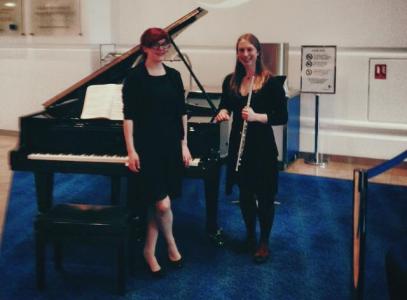
It's a shame that the rules about reviewing prevent me from just using a couple of superlatives like stunning & brilliant and leaving it at that. This duo are nothing short of amazing. It goes without saying that they display effortless technique, wonderful rapport, and excellent musicianship in bucket-loads.
The program was rather cleverly put together and basically brought together composers whose link was mainly that they had come from Russia in it's broadest sense and included countries that the USSR had invaded.
They started with Six Pieces for Flute & Piano by Amirov, which made us realise we were in for a treat of an evening. These pieces, based on Azeri folk melodies, gave Rachel a chance to show her wide pallet of flute colours, and her superior technique, together with Jemima's sympathetic and musical accompaniment. My favourite piece, No 5 At the Spring, was evocative and fresh, with lovely bird song, and was followed by a moody Nocturne - quite delightful.
This was followed with 4 pieces from Early Morning by Gretchaninoff, a composer I have always enjoyed, and this was wonderful. The Joker, was a good circus style laugh - and we did laugh. Rachel always displays a pure sound and tone, and joined with Jemima's excellent piano playing we couldn't fail to be entertained.
The 71, year old Ukrainian, Stankovych, is a new composer to me, and I suspect the rest of the 16 strong audience. In spite of being a somewhat "modern" composer, the emotional content of the music always came through and was delivered with great poise. There can be few Elegy's that hit the spot like this one did.
The quite well known Aria by Taktakishvili always reminds me of Rachmaninoff "Vocalise", but with so much more passion and musical intensity. It was beautifully performed - of course.
The main item in the program, the Prokofiev Sonata made me realise how lucky we are to have two such musicians in the area, working together. They brought out the dry wit I always associate with Prokofiev, and in the 2nd movement Scherzo, we saw just how special these two performers are. It takes a great composer to write a simple piece of music, and equally great performers to bring it off, and that's just what we got in the Andante, followed by the rather martial, slightly tongue in cheek Allegro con brio. Brilliant!
The encore, Dvorak's 'Humouresque', was one of the most musical performances of this well-known piece I have heard for many a year. Well done and thank you for a lovely evening of excellent music making.
Andrew Hodkinson
LIVE MUSIC WITH TRACE TAYLOR & BAND - Trace & The Trees
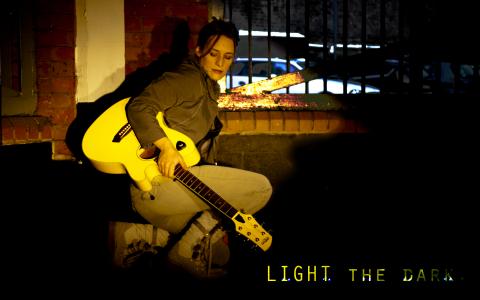
Trace Taylor gave an enthusiastic and vibrant performance in The Spring Bank Arts Centre in New Mills. This venue was previously a small church; it has retained it's excellent acoustics but its pews have been replaced by more comfortable seats. The band, The Trees, consisted of her husband, Ween Taylor, on drums and percussion, Pete Townsend on bass and guitar and Mark Lawrence on lead guitar.
The programme had been well thought out giving a variation in tempo and style in each of the sets. A good robust start mellowing to enchanting pieces like Crystal Ice and building up the excitement again before the interval. Trace did all the singing, but with her strong wide ranging voice, there was no need for another. When not accompanying herself on guitar and occasionally the keyboard and shakers, she was living her songs with hands and body and maintained the focus of attention on herself. Trace had an easy, in control, stage manner and interacted well with her audience. Ween was indeed superman, hidden behind a screen of instruments, playing intricate rhythms on his drums and sticks and cymbals and bells and whatever else he had hidden away. Pete seemed relaxed and comfortable on the bass and it was obvious all three had played together for a long time. Luke was making his debut with the band and discharged his role well as lead guitar.
During the interval, Pete read an excerpt from his second book, Kind of Misbehavin', which he described as a comic crime caper. This book has a Jazz infused overtone whereas his previous book, Three String Blues, as its title suggests reflects a different style of music.
After the interval, and a chance to cool off in the rain, the band started again with a rousing number by Madness gradually slowing to more evocative songs like One Day written by Trace. Pete playing guitar rather than bass on this number. Then Trace sang Leyla by Eric Clapton (despite it being written by a man for a woman) gradually raising the tempo again getting the audience rocking, tapping their feet and clapping. Ending with Godman, Funky One and, after handing out rattles to some of the audience, Let Live. A good up-beat end to the evening.
Carolyn Page
ORCHESTRA CONCERT - High Peak Orchestra
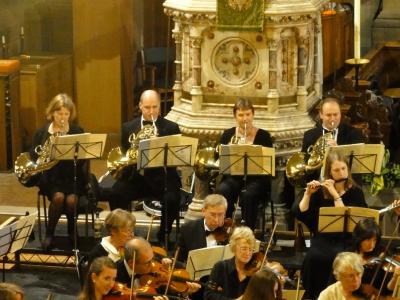
This has to be one of the best concerts that HPO have given on the Fringe in recent years. Their assured playing and conductor Andrew Hodkinson’s confident direction ensured a thrilling experience.
The concert opened with Debussy’s l’apres-midi d’un Faune which reminded us how good the HPO woodwinds are. This quite short , but highly impressionistic work, was followed by Schumann’s ‘cello concerto with the wonderfully talented Miriam Brown as soloist. Still at the Northern College Miriam is rapidly acquiring a fine reputation.
The concerto was composed in 1850, which saw the start of Schumann’s decline into insanity. But there is only a hint of that in the generally lyrical music. The excellent programme notes suggested that the work is “brooding and serious” but in this performance ,particularly the extended solo in the second movement accompanied by the principal ‘cello, Mairy Dainton, the total effect was enchanting.
The concert concluded with Mahler’s fourth symphony. This is another demanding work for the woodwinds and the HPO woodwinds were outstanding with very carefully judged dynamics. The high spot was the fourth movement with Jane McNeill singing the beautiful song “ The Heavenly Life”, music to which Jane’s lovely voice seems particularly suited.
A large audience greeted both soloists with well deserved acclamation.
Peter Low
ROOTS & FOLK WITH RAINTOWN SEERS - The Raintown Seers
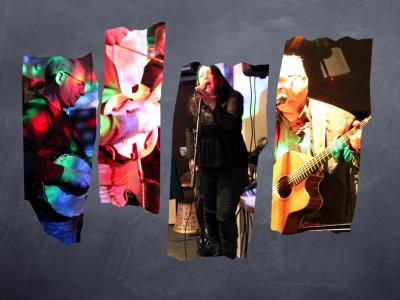
A solid performance of folk music from this experienced trio. Neil Fisher, Lisa Lovatt and Steve Hyde's ability to harmonise well struck me from the start and I knew I was in for a good time. They were easy to listen to and their sound came over well in the Old Hall Cellar. Lisa and Neil did most of the singing. Steve mainly played his mandolin and mandola but for the second number, I've Got This Friend, he switched to banjo and another his concertina. Neil mainly played guitar, but switched to playing a second mandolin on a song called Benny Rothman. Benny Rothman being a Manchester rambler who led a trespass from Hayfield Quarry over Kinder Scout during the Freedom to Roam campaign.
Many of the other of his songs they sang were also based on interesting snippets of local history, for example Peter's Stone. Another song about Mermaid's Pool half way up Kinder Scout was based on a poem by Henry Kirke. As well as Steve's songs, they also sang three Ewan MacColl songs in the middle of their performance: The First Time I Ever Saw Your Face, The Bonny Ship the Diamond and Sweet Thames, Run Softly. Lisa sang well throughout and I also recognised the drone of the shruti box she played at one point.
More songs written by Steve followed including Flawed Character written for all husbands and Here Come The Brides. They performed a fine rendition of their version of a traditional song Keys of Canterbury before ending with an appropriately named song The Last Boat.
Carolyn Page
AMERICAN BLUEGRASS MUSIC - Aprille and the Shower
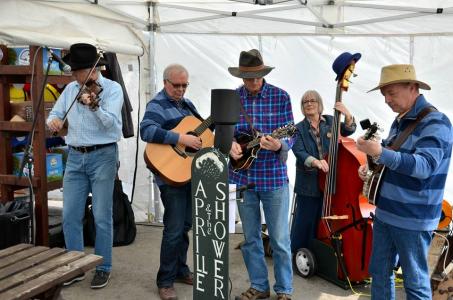
Just back from performing at the 26th Conwy Bluegrass Festival in North Wales the five piece band named 'Aprille and the Shower' were to be found playing outside the Railway Tavern to a large Saturday crowd of happy jigging eaters and drinkers. These high peak mountain men consist of mountain mama Aprille on bass and the rest of her clan playing Mandolin, 5 string Banjo, Guitar and of course Fiddle.
They go to West Virginia once a year to refresh their material and have apparently come back with a new song entitled 'I miss you baby - but my aims getting better!' Steve on Mandolin has a good line of patter. They play a lot of favourites from Johnny Cash onwards and judging by the landlords Steve's reaction they will be coming back soon - in fact on 16th and 23rd july
Jonathan Rowlands
ACAPELLA AND CAKE - Ordsall Acapella Singers
'I got rhythm' was the opening number sung by the 27 piece choir of 20 ladies and 7 men that form part of the 45 regular members of the Ordsall Acapella Singers – they sure had! Welcomed to the United Reform church venue by their conductor, solo singer and entertaining compère Jeff Borrowable, the Salford based choir set off at a fast pace. The hour programme ranged from the Beatles through to Babra Streisand and Eric Clapton. My particular favourites were 'Long and Winding Road' and 'Tears in Heaven'
Being a Welsh romantic myself, I suppose I'm slightly biased when it comes to a good piece of choral singing. It always brings a tears to my eyes . So it was with great pleasure that I was able to sit back in the sunlit church close my eyes and let the arrangements and harmonies wash over me. You could feel and see the obvious pleasure that the choir got out of performing for their audience. I promise that when my eyes were closed I didn't drift off and think about the the cake as promised in the shows title. After the show I also discovered that the good ladies themselves made all the gorgeous cakes - where is my choir application form?
Jonathan Rowlands
AN EVENING WITH CATHY RIMER - Cathy Rimer
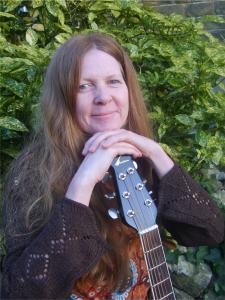
To quote the information in the Fringe booklet - ‘You will be spellbound by the magic of her words and music’ - we certainly were. Cathy is an experienced performer, well known locally from her appearances at Club Acoustic. Tonight she created a programme of songs she has written herself and dovetailed the collection to link personal experience with emotions and situations that we all encounter.
The songs in the first half of the evening dealt very much with personal encounters such as ‘It’s too late’ dealing with the break up of a relationship and ‘Summer’s child’ about her daughter. Cathy’s song writing style draws you in - an uncomplicated guitar accompaniment allows you to concentrate on the sweet clarity of her voice in flowing, melodic vocal lines. The lyrics, which contain the sentiment of the songs are sung with great clarity.
The second half contained songs which explained why the Red Cross was one of Cathy’s nominated charities for proceeds from tonight’s concert. The songs revolved around a relative; an aid worker who was abducted and later killed. Despite such inhumanity, Cathy wants her songs to give a voice to people who never had a chance to say what they felt ‘I wanted to be the one who made your hear sing’. This selection finished with a particularly beautiful Peace Song - ‘Take my hand and show me the way’.
The evening closed with Cathy inviting Martin Hall to accompany her on guitar on a jazz influenced rendition of ‘Bright, sunny day’, a song she had performed earlier in a different style.
The Green Man Gallery was an ideal setting for an intimate performance such as this. A small audience still felt as though we were almost at capacity! As the other charity Cathy is supporting with her Fringe events, I’m sure The Green Man Gallery would be able to find more chairs if I can encourage you to attend one of her future performances on 14 and 17 July.
Carol Bowns
WILL HAWTHORNE PERFORMS THE KINKS' ARTHUR - Will Hawthorne
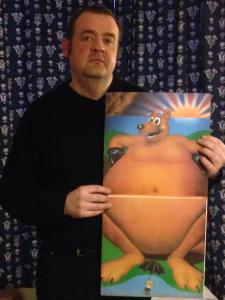
The Barrel Room, Underground Venue: further shows 18 & 25 July
This review could be very short: ‘Arthur’ is one of the great English pop albums and Will Hawthorne sang the whole thing (plus seven other Kinks’ songs for good measure) letting the words and music speak for themselves. It was marvellous. You must go. The end.
Apparently I’m required to say more. Well the audience loved it – not just me. They clapped wildly and enthusiastically – Will might even have blushed a little, so warm was the reception. The audience joined in with the choruses – sang pretty much the whole of ‘Sunny Afternoon’. We had a smashing time. The end. Again.
Ray Davies was born towards the end of World War Two in north London. He had six older sisters and a younger brother, Dave, who was also part of the Kinks. Ray Davies is the best English songwriter of the last century. You might not agree, but I’m not prepared to argue. He was just 25 when he wrote ‘Arthur (Or the Decline and fall of the British Empire)’ – which was recorded and released in 1969.
Broadly speaking the album – the songs had been intended for a TV play but that was never made – tells the life of a pretty ordinary suburban family over a period of 50 years from around 1914. Some people say the opening song ‘Victoria’ is the best on the album – it’s an upbeat song in praise of the days of Empire. [You suppose Davies is being ironic here – given the later songs – but that is one of the great things about him, he is willing to give voice to others, and the whole album reflects different ways of seeing and understanding the world].
After that are two songs about the First World War. ‘Some Mother’s Son’ is achingly poignant – and perhaps Will could have sung it a bit more slowly (more in keeping with the original tempo). Side One of the album ends with ‘Australia’ – a song which is again upbeat on the surface, but bitingly critical lyrically. The dream of the emigrant is dismissed. Side Two begins with ‘Shangri-La’ which is clearly ironic – the suburban ideal is, in Davies’ view, a product of materialist brainwashing. He is on the side of ordinary, hardworking working-class people – but he cannot accept the deference they show to the undeserved social elite (‘She’s bought a hat like Princess Marina’).
Forty-five years later the songs still have a social resonance; England (Davies writes only of England here) is still socially divided – though class relationships are more complex now than then. Some critics found his lyrics didactic but for me they cut through the wilful obfuscation of millionaire, Eton-educated government ministers who would have us believe that ‘we are all in this together’. We weren’t in 1969, nor are we now. Great show, Will. Many thanks. The end.
Keith Savage
HARP QUARTET CONCERT - CLOUDS Harp Quartet
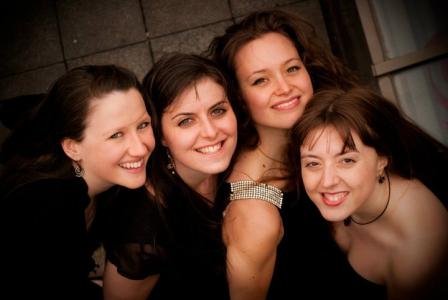
There may be two harp quartets in Britain – and you could hear them both in Buxton next Monday. What are the chances of that? Briefly, 4 Girls, 4 Harps play arrangements of some familiar (others less so) classical pieces at St John’s Church http://www.buxtonfestival.co.uk/music-series/4-girls-4-harps/.
The Clouds Harp Quartet repertoire relies almost exclusively on one of their number, Esther Swift. Esther met Elfair Dyer, Rebecca Mills and Angelina Warburton at the Royal Northern College of Music and in 2008 she asked them if they wanted to play a piece that she had written. Interestingly, given their shared classical background, Esther doesn’t write the quartet’s music down. She teaches the others the pieces and they play them by ear.
This may account for the relatively loose style of playing the quartet has developed. This is not to say that it is not carefully and tightly arranged and structured, but they are able to concentrate on each other and their instruments as they play – rather than having to look at the score. Given the size of the instruments the performance is necessarily very physical and dramatic in potential which is realised by musicians who seem genuinely to relish the opportunity to play together. It could also be that Esther’s musical influences encourage her to write in a slightly freer style. She obviously listens to folk music – she is Scottish and the programme included a piece based on the murder ballad The Twa Sisters and the encore was an arrangement of Burns’ Ae Fond Kiss. You can also imagine that Esther listens to the music of the likes of Ludovico Einaudi, for example.
In her arrangements she uses the four instruments to create overlapping and interwoven lines and rhythms with phrases and patterns being passed from one harpist to the other. Most of her pieces take their inspiration from the natural world – two long suites Water and Clouds took up most of the 90-minute programme. On first hearing Clouds – the piece that Esther first offered to the new quartet – may yet remain the most varied and complex piece.
Esther’s standing as a composer is such that she has been offered commissions; the most recent of which is The Twa Sisters work which, by nature of its subject matter, requires playing that is heavy and dark. Angelic harps it is not.
The audience was totally captivated by the music and the musicians. The quartet is playing three more times in Buxton – and they have chosen to play in four different venues. The Fringe always throws up unexpected pleasures and delights; this is one of them, don’t miss Clouds Harp Quartet.
Keith Savage